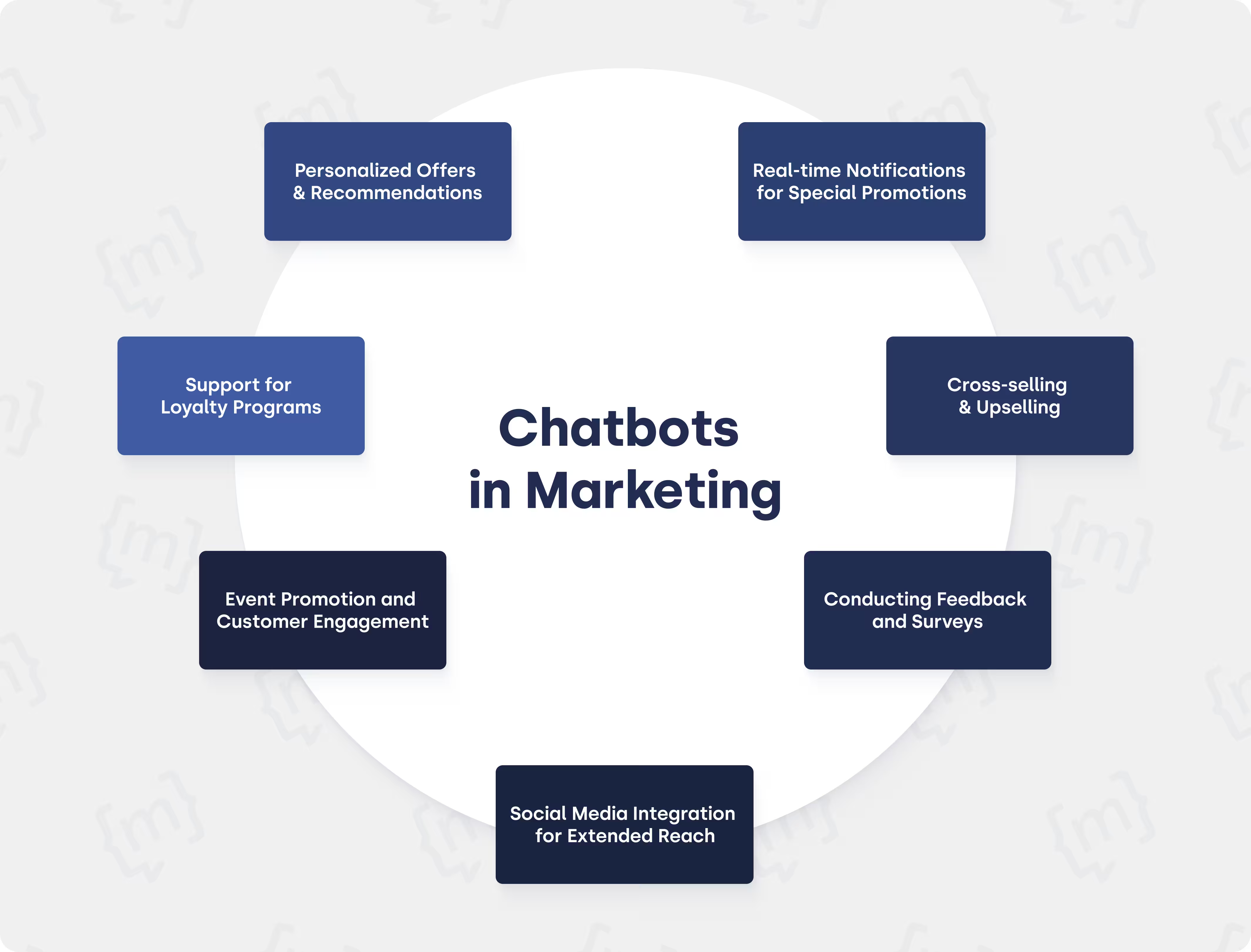Key features of chatbots in retail
Chatbots are small all-rounders in retail that can take on very different tasks. Digital assistants are becoming increasingly human, able to understand connections and give customers the feeling of interacting with a committed employee. Nevertheless, they should never deceive, but be transparently informed about communication with the chatbot.
Customer service and support assistance
Whether on public holidays, on weekends or in the middle of the night: the chatbot is available 24/7 for all customer concerns. Without waiting times, it provides real-time answers to inquiries about product availability, the delivery status of an order or product details. Customers don't have to wait long for an answer by email and don't spend any waiting time on the service hotline.
Every question that the chatbot answers automatically saves an email or a call to the service department. By retail companies using Automate customer service, they can save service costs and thus free up employees for value-adding tasks.
The chatbot as a virtual product advisor
Similar to a retail salesperson in a local store, the digital assistants can advise customers and give them Make product recommendations. Quick, individual advice reduces shopping cart abandonments. Customers immediately find what they are looking for, which particularly benefits shops with a very complex range of goods.
A customer is looking for a fully automatic coffee machine in an electronics shop. The model should have a milk frothing nozzle, offer preset coffee strengths and have an automated rinsing and descaling program. The maximum budget is 800€. He asks the chatbot for available models with these features and receives a selection of the 5 devices that are eligible for this. He selects one of them and saves himself the time of laboriously clicking through the range of products.
Virtual assistants make order and delivery tracking easier
Typical questions from customers to support include:
- Where is my order right now?
- How can I track my shipment?
- Can I change the delivery address later?
- Can I also pick up my order at a branch?
Each of these questions costs money in the end, because a service employee has to do manual research in order to provide the customer with the right answer. Chatbots can now easily take over order and delivery tracking in retail and thus sustainably reduce ticket volumes.
Marketing & Promotion Support
Chatbots in retail not only answer visitors' questions in a targeted manner, but also provide proactive information about current offers, discount campaigns and new products. Via chat marketing is a chatbot able to get to know customers better and make personalized recommendations to them on this basis.
Chatbots can be integrated into all relevant messengers, such as Facebook Messenger or WhatsApp; CRM integration is even possible. An exciting topic in this context is automated lead generation via chatbots. Instead of filling out complex forms, the chatbot asks the customer for their contact details, which are then fed directly into the CRM.
Other options for using chatbots in marketing:

Dealing with frequently asked questions (FAQs)
Customer service in retail often has to answer the same questions over and over the phone. As a result, the volume of tickets is constantly growing and there is little time left for truly value-adding inquiries. The result is slower processing times, dissatisfied employees as a result of the heavy workload and the same customer inquiries over and over again, as well as high personnel costs, which generate costs. Chatbots can provide relief in all of these areas in retail by automatically answering recurring inquiries. The saved resources can be used for value-adding tasks.
The benefits of using chatbots
The use of a chatbot in digital customer communication in retail is an investment that quickly pays off. Whereas in the past, suitable solutions had to be developed individually and with great effort, chatbot providers now provide flexible solutions for a fixed monthly price. Depending on the size of the company, the number of chat channels and the selection of languages, there is a suitable and profitable solution for every need.
Companies benefit from around-the-clock availability
While service hours for personal customer service are generally limited in the evening, on weekends and on public holidays, a chatbot is available around the clock — without night and public holiday surcharges. Customers who only use the time for online shopping after work in the late evening hours can immediately ask their digital contact person questions. This reduces the risk that they will interrupt their customer journey and perhaps end up with the competition.
High efficiency & time savings through chatbots in retail
Chatbots automate routine tasks, answer frequently asked questions, and handle personal interaction with customers. Instead of employees spending time answering repetitive inquiries, they can focus on more complex tasks that require experience, expertise, and human know-how.
In addition, there are the positive experiences of customers, who get their questions answered quickly and can even become regular customers or make recommendations.
Chatbots enable personalized customer interaction
Modern, digital assistants are able to query the personal preferences and needs of customers and then recommend suitable products.
Through a simple, chat-based dialogue, chatbots can provide customized product recommendations, special offers, or targeted information. This personalized customer interaction increases the likelihood of cross-selling and up-selling. If a customer buys a laptop, the chatbot can also offer them a laptop bag, spare cables, a mouse or an external storage device.
Reduce operating costs by using digital assistants
The use of chatbots significantly reduces operating costs because service capacities are saved and no large service team has to be employed to process routine inquiries. In the end, this not only reduces personnel costs, but also reduces the need for additional infrastructure such as offices, telephone technology, electricity and much more.
An example calculation:
MoinAI calculated the ROI for using chatbots in customer service based on experience.
- Ticket volume per month: 6000
- Routable support requests from the chatbot: 15%
- Average ticket processing time: 10 minutes
According to this calculation, around 630 tickets per month can be processed by the chatbot, which corresponds to a time saving of 6,300.00 minutes and a cost saving of €3,535.64 per month.
Improving customer satisfaction and customer loyalty
Customers today have high expectations of a shop's service. Easy navigation to the desired product, quick answers to their questions about the product and short response times in customer service are important to them. By using a chatbot, retailers can meet these expectations and perhaps thus secure a decisive competitive advantage.
Chatbots are the solution for shopping cart abandonment in retail
Possible reasons for shopping cart cancellations:
- Shipping costs suddenly communicated
- Complicated/unclear return conditions
- Complex checkout process
- Inadequate payment methods
- Lack of transparency in delivery times
- Lack of security or trust signals
It is precisely at these and other points that the chatbot can provide support, create trust, answer questions and create transparency. As a result, cancellation rates can be significantly reduced and more interested visitors can be converted into paying customers.
Challenges and solutions when implementing chatbots
Integrating chatbots into existing systems and processes often seems complex. However, the implementation of a chatbot solution is easy to handle in many cases. What should be considered when choosing is that the chatbots are seamlessly connected to existing CRM systems, e-commerce platforms and other IT solutions so that no data silo is created. Good chatbot solutions offer various features for easy integration and support well-known tools such as Zendesk, SAP or Hubspot.
Safety concerns should also be addressed. When choosing a chatbot, companies should check how customer personal data is handled:
- Is there two-factor authentication?
- Is anonymized data processing ensured?
- Does the chatbot provide an IP allowlist?
To avoid compliance violations, retailers should rely exclusively on GDPR-compliant solutions that offer secure encryption of data and are hosted in Germany. In order to close internal security gaps, roles and access rights should be granted to employees so that everyone only has access to the information they absolutely need.
Everyone should know the limits of AI
Dealing with the biggest Chatbot fails can avoid image damage and expensive mistakes. In the end, a chatbot remains a technical tool that has no human mind and — as in the case of the DPD chatbot — can even become abusive towards customers. In this case, the virtual assistant began to criticize their own company during a customer meeting. In another case, the Microsoft pilot became emotional towards a customer and even reprimanded him.
To avoid fails like this, retailers should put their chatbot provider through their paces. Control and transparency, secure use of generative AI, security and GDPR compliance, and human take-over should be paramount.
Case study: Successful integration of a chatbot with Sephora
Sephora, an international cosmetics and beauty retail chain, implemented a chatbot called “Sephora Virtual Artist.” The chatbot enables customers to virtually try out cosmetic products. Augmented Reality (AR) allows users to see how different products, such as lipsticks or eyebrow pencils, look on them before making a purchase.
The chatbot analyses the preferences and buying behavior of customers in order to make personalized product suggestions. Customers receive recommendations based on their previous purchases and skin type. In addition, Sephora also uses the chatbot for customer inquiries around the clock. The chatbot answers questions about product availability, order status and return conditions.
It is important to emphasize that not every online shop needs such an elaborate chatbot as Sephora, which offers users augmented reality. An AI chatbot that includes a text-based product advisor is completely sufficient for most retailers who want to use a chatbot online and produces great results. For example, VELUX's Online Sales Organization (VELUX OSO for short) is using an AI chatbot in various online shops and is achieving impressive results, such as a marked decline in live chat volume and a significantly reduced support volume per 100 orders. Read more about this in the case study AI chatbot in pre- and after-sales in e-commerce.
Conclusion: Chatbots are so efficient in retail
In short, chatbots enrich retailers with their ability to provide 24/7 customer service, automate routine tasks, and provide personalized recommendations. They improve efficiency, reduce operating costs and significantly increase customer satisfaction. Retailers should use the potential of chatbots to assert themselves in the highly competitive market and increase their service quality, customer loyalty and thus also their turnover.
AI technologies are rapidly evolving. They are increasingly able to understand customer concerns and interact with visitors in an even more individual way. By understanding the context of a question even more precisely, they can not only provide standard answers in the future, but also offer complex advice.

.svg)









